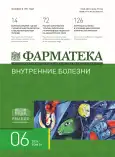Adherence to adjuvant hormonal therapy for luminal HER2-negative breast cancer: results of a patient survey
- Authors: Gordeeva O.O.1, Bokova S.E.2
-
Affiliations:
- Lopukhin Federal Research and Clinical Center of Physical-Chemical Medicine of Federal Medical Biological Agency
- IDA “Movement Against Cancer”
- Issue: Vol 31, No 6 (2024)
- Pages: 224-228
- Section: Oncology
- URL: https://bakhtiniada.ru/2073-4034/article/view/273337
- DOI: https://doi.org/10.18565/pharmateca.2024.6.224-228
- ID: 273337
Cite item
Abstract
Background. Adherence to adjuvant hormonal therapy for patients with hormone-dependent HER2-negative breast cancer is of fundamental importance and affects the treatment outcomes.
Objective. Assessment of the adherence to AHT among patients with hormone-dependent HER2-negative breast cancer after radical treatment, as well as possible reasons for its decline.
Methods. In order to study compliance, we initiated a survey among patients with luminal HER2-negative breast cancer who were receiving or had previously received adjuvant hormonal therapy. The study involved 420 patients. 64.5% of patients took the drug without fail, and 19% of patients occasionally (up to 5 times a month) missed doses. A decrease in compliance was noted with an increase in the duration of therapy. The most common reasons for interrupting therapy before the prescribed time were adverse events (10%), lack of the drug in the pharmacy (10%), forgetfulness (5%), and some patients did not consider it necessary to take the prescribed drugs (2.4%). Every second patient did not have the necessary amount of information about the treatment.
Results. The results of the study emphasize the need to develop solutions to inform patients about the importance of therapy, the risks associated with refusing treatment, as well as side effects and ways to correct them. Such tools will increase patient adherence to therapy, and therefore improve treatment results and reduce the likelihood of relapse.
Full Text
##article.viewOnOriginalSite##About the authors
O. O. Gordeeva
Lopukhin Federal Research and Clinical Center of Physical-Chemical Medicine of Federal Medical Biological Agency
Author for correspondence.
Email: Gordeeva.oo@yandex.ru
ORCID iD: 0000-0002-8266-0218
Cand. Sci. (Med.), Medical Oncologist
Russian Federation, MoscowS. E. Bokova
IDA “Movement Against Cancer”
Email: Gordeeva.oo@yandex.ru
Russian Federation, Moscow
References
- Злокачественные новообразования в России в 2021 г. (заболеваемость и смертность). Под ред. А.Д. Каприна, В.В. Старинского, Г.В. Петровой. М., 2023. 250 с. [Malignant neoplasms in Russia in 2021 (morbidity and mortality). Edited by A.D. Kaprin, V.V. Starinsky, G.V. Petrova. Moscow, 2023. 250 p. (In Russ.)].
- Torre L.A., Bray F., Siegel R.L., et al: Global cancer statistics, 2012. CA Cancer J Clin. 2015;65:87–108. doi: 10.3322/caac.21262.
- GLOBOCAN: Estimated Cancer Incidence, Mortality and Prevalence Worldwide 2012 [Internet][cited 2018 Jun 26] Available from: http://globocan.iarc.fr/old/bar_sex_site.asp?selection=3152&title=Breast&statistic=2&populations=6&window=1&grid=1&color1=5&color1e=&color2=4&color2e=&submit=%C2%A0Execute%C2%A0
- Siegel R.L., Miller K.D., Jemal A. Cancer statistics, 2018. CA Cancer J Clin. 2018;68:7–30. doi: 10.3322/caac.21442.
- Perou C.M., Sorlie T., Eisen M.B., et al. Molecular portraits of human breast tumours. Nature. 2000;406(6797):747–52. doi: 10.1038/35021093.
- NCCN Clinical Practice Guidelines in Oncology (NCCN Guidelines®) Breast Cancer Version 2.2024 – March 11, 2024.
- Cardoso F., еt al. 5th ESO-ESMO international consensus guidelines for advanced breast cancer (ABC 5). Ann Oncol. 2020 Dec;31(12):1623–49.
- Клинические рекомендации. Рак молочной железы. 2021. [Clinical recommendations of the Ministry of Health of the Russian Federation. Breast cancer. 2021. (In Russ.)].
- Tamoxifen for early breast cancer: an overview of the randomised trials. Early Breast Cancer Trialists’ Collaborative Group. Lancet. 1998;351(9114):1451–67.
- Pan H., Gray R., Braybrooke J., et al. 20-Year risks of breast-cancer recurrence after stopping endocrine therapy at 5 years. N Engl J Med. 2017;377:1836–46. doi: 10.1056/NEJMoa1701830.
- Francis P.A., Fleming G.F., Lang I., et al.; SOFT Investigators and the International Breast Cancer Study Group (a division of ETOP IBCSG Partners Foundation). Adjuvant Endocrine Therapy in Premenopausal Breast Cancer: 12-Year Results From SOFT. J Clin Oncol. 2023 Mar 1;41(7):1370–75. doi: 10.1200/JCO.22.01065. Epub 2022 Dec 9. Erratum in: J Clin Oncol. 2023 Sep 1;41(25):4187. PMID: 36493334; PMCID: PMC10419521.
- Davies C., Pan H., Godwin J., et al. Adjuvant Tamoxifen: Longer Against Shorter (ATLAS) Collaborative Group. Long-term effects of continuing adjuvant tamoxifen to 10 years versus stopping at 5 years after diagnosis of oestrogen receptor-positive breast cancer: ATLAS, a randomised trial. Lancet. 2013 Mar 9;381(9869):805–16. doi: 10.1016/S0140-6736(12)61963-1. Erratum in: Lancet. 2013 Mar 9;381(9869):804. Erratum in: Lancet. 2017 May 13;389(10082):1884. PMID: 23219286; PMCID: PMC3596060.
- Gnant M., Fitzal F., Rinnerthaler G., et al.; Austrian Breast and Colorectal Cancer Study Group. Duration of Adjuvant Aromatase-Inhibitor Therapy in Postmenopausal Breast Cancer. N Engl J Med. 2021 Jul 29;385(5):395–405. doi: 10.1056/NEJMoa2104162.
- Johnston S.R.D., Harbeck N., Hegg R., et al.; monarchE Committee Members and Investigators. Abemaciclib Combined With Endocrine Therapy for the Adjuvant Treatment of HR+, HER2-, Node-Positive, High-Risk, Early Breast Cancer (monarchE). J Clin Oncol. 2020;38(34):3987–98. doi: 10.1200/JCO.20.02514.
- Slamon D.J., Fasching P.A., Hurvitz S., et al. Rationale and trial design of NATALEE: a Phase III trial of adjuvant ribociclib + endocrine therapy versus endocrine therapy alone in patients with HR+/HER2- early breast cancer. Ther Adv Med Oncol. 2023 May 29;15:17588359231178125. doi: 10.1177/17588359231178125. Erratum in: Ther Adv Med Oncol. 2023 Sep 29;15:17588359231201818. PMID: 37275963; PMCID: PMC10233570.
- Yussof I., Mohd Tahir N.A., Hatah E., Mohamed Shah N. Factors influencing five-year adherence to adjuvant endocrine therapy in breast cancer patients: A systematic review. Breast. 2022 Apr;62:22–35. doi: 10.1016/j.breast.2022.01.012.
- Murphy C.C., Bartholomew L.K., Carpentier M.Y., et al. Adherence to adjuvant hormonal therapy among breast cancer survivors in clinical practice: a systematic review. Breast Cancer Res Treat. 2012;134(2):459–78. doi: 10.1007/s10549-012-2114-5.
- Simon R., Latreille J., Matte C., et al. Adherence to adjuvant endocrine therapy in estrogen receptor-positive breast cancer patients with regular follow-up. Can J Surg. 2014;57(1):26–32. doi: 10.1503/cjs.006211.










